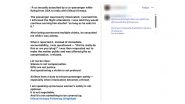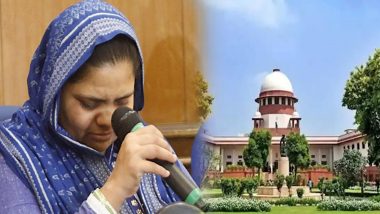New Delhi, August 24: The Gujarat Government on Thursday told the Supreme Court that all necessary compliances had been done before granting remission to 11 convicts who had gang-raped Bilkis Bano and murdered her family members during the 2002 Godhra riots. Additional Solicitor General SV Raju appearing for the Gujarat government reiterated before Justices BV Nagarathna and Ujjal Bhuyan that all necessary compliances had been done before granting the remission.
The apex court was hearing the plea filed by Bilkis Bano and others challenging the premature release of 11 convicts. Advocate Rishi Malhotra, appearing for one of the convicts, told the bench that the scheme of the 1992 Gujarat remission policy did not require a unanimous or majority decision, but only a collation of the views of various stakeholders. Bilkis Bano Case: Supreme Court Questions Gujarat, Centre on Selective Application of Pre-Mature Release Policy for Remission of 11 Convicts.
"The Mumbai judge's (adverse) view was based on their remission policy," the advocate said. Malhotra further said that his client has served over 15 years of actual sentence and that the state government gave him relief after taking note of his conduct. He apprised the bench that he had studied and practiced law. "Today, almost a year has lapsed and there has not been a single case against me. I happen to be a lawyer at a motor accident claims tribunal. I was a lawyer and I have again started practicing," Malhotra argued on behalf of his client. Bilkis Bano Case: Supreme Court Hears Arguments Against Maintainability of PILs Challenging Remission to 11 Convicts.
To this, the bench said, “law is supposed to be a noble profession” while expressing surprise at how his client can practise law after his conviction. Malhotra replied that his client had served his sentence. The bench said, "Post-conviction, whether licence to practise can be given? Law is supposed to be a noble profession. Bar Council (of India) has to say whether a convict can practise law. You are a convict, there is no doubt about that. You are out of jail due to the remission granted to you. The conviction remains, only the sentence is cut short.”
Section 24A of the Advocates Act states that a person convicted of an offence involving moral turpitude cannot be enrolled as an advocate. It further states that disqualification for enrolment shall cease to have effect after a period of two years has elapsed since his release or dismissal or removal. Senior advocate Sonia Mathur, appearing for another convict, argued that once the sentence was reduced the convict cannot be deprived of his liberty. She said the convicts are entitled to be prematurely released subject to the condition being fulfilled, adding that even the top court has been ruling in favour of premature release of convicts. The hearing in the case will resume on August 31.
Earlier, the apex court queried the Gujarat and Central governments about the selective application of the pre-mature release policy for the remission of convicts who are serving jail terms. It observed that the opportunity to reform and reintegrate into society should be given to every eligible convict. Bilkis Bano and others had approached the top court challenging the premature release of 11 convicts. Some PILs were filed seeking directions to revoke the remission granted to 11 convicts.
The pleas were filed by the National Federation of Indian Women, whose General Secretary is Annie Raja, Member of the Communist Party of India (Marxist) Subhashini Ali, journalist Revati Laul, social activist and professor Roop Rekha Verma and TMC MP Mahua Moitra. The Gujarat government in its affidavit had defended remission granted to convicts saying they completed 14 years of sentence in prison and their “behaviour was found to be good”. The State government had said it has considered the cases of all 11 convicts as per the policy of 1992 and remission was granted on August 10, 2022, and the Central government also approved the release of convicts.
It is pertinent to note that the remission was not granted under the circular governing grant of remission to prisoners as part of the celebration of "Azadi Ka Amrit Mahotsav”, it had said. The affidavit stated, “State government considered all the opinions and decided to release 11 prisoners since they have completed 14 years and above in prisons and their behaviour was found to be good.” The government had also questioned the locus standi of petitioners who filed the PIL challenging the decision saying they are outsiders to the case. The pleas said they have challenged the order of competent authority of the government of Gujarat by way of which 11 persons who were accused in a set of heinous offences committed in Gujarat were allowed to walk free on August 15, 2022, pursuant to remission being extended to them.
The remission in this heinous case would be entirely against public interest and would shock the collective public conscience, as also be entirely against the interests of the victim (whose family has publicly made statements worrying for her safety), pleas stated. The Gujarat
What is your reaction to Karenjit Kaur: The Untold Story of Sunny Leone?
(The above story is verified and authored by ANI staff, ANI is South Asia's leading multimedia news agency with over 100 bureaus in India, South Asia and across the globe. ANI brings the latest news on Politics and Current Affairs in India & around the World, Sports, Health, Fitness, Entertainment, & News. The views appearing in the above post do not reflect the opinions of LatestLY)













 Quickly
Quickly


